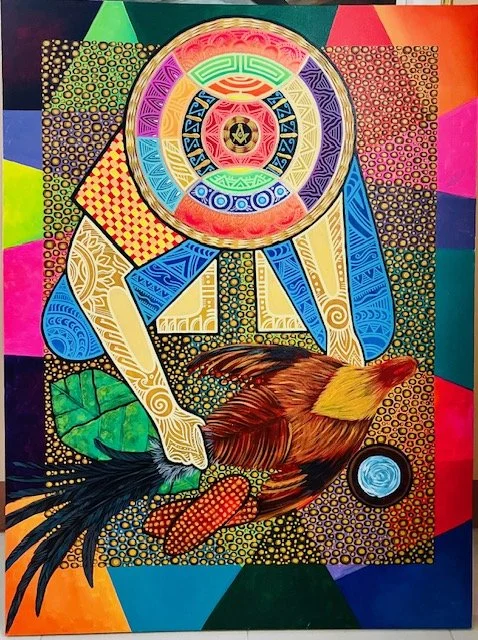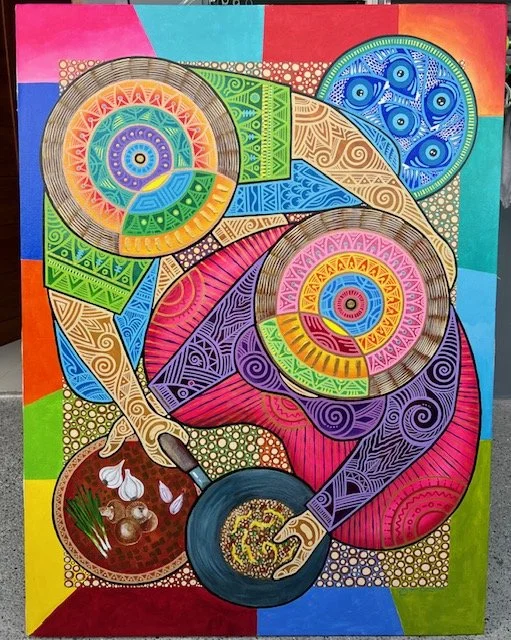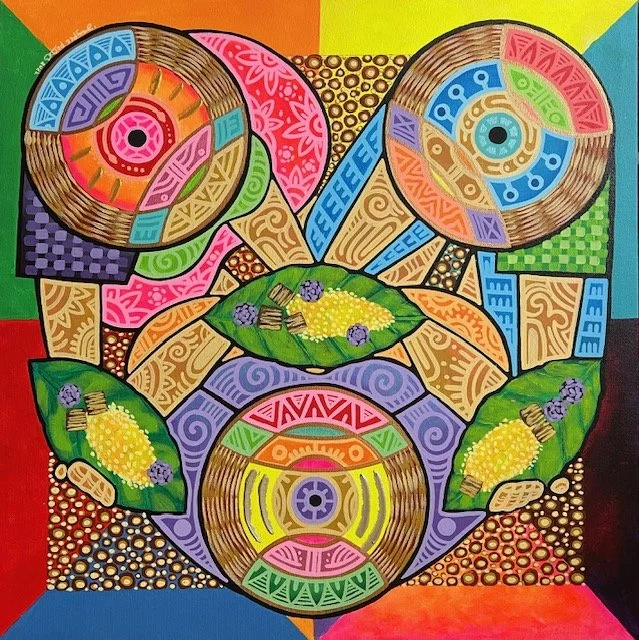After Watching E.T.
By Dorian S. Merina
Jaypee Portez - PANABONG (2022), Acrylic on canvas
Image description: The abstract painting features various colorful, geometric shapes that form the figure of a person, as viewed from above. The figure’s head takes the form of concentric circles; their forearms, pants, and feet are rendered in spirals, circles, and lines. The figure holds a rooster by its tail; the rooster is rendered in a naturalistic way, unlike the rest of the abstract painting. The figure and the rooster are rendered against a dot-patterned middleground and a background featuring vibrant shades of pink, blue, green, orange, and purple.
New Moon
Alt text for above image: The poem “New Moon” or “Bagong Buwan" in English and Tagalog, Tagalog rendered in Baybayin script. The Tagalog words lie to the right of or below the English words, weaving in and out.
Transcription: In English script: “New Moon: Look/ there above the hillside/ a slash of mineral light/ carved into the night sky/ samurang.” In Tagalog: "Bagong Buwan: Tignan mo doon / sa taas ng gulod / may liwanag inukit / sa madilim na langit / samurang. Read together: “New Moon, Bagong Buwan: Look, Tignan mo doon/ there above the hillside, sa taas ng gulod/ a slash of mineral light, may liwanag inukit/ carved into the night sky, sa madilim na langit/ samurang, samurang.”
Jaypee Portez - KIAMPONG (2024), Acrylic on canvas
Image description: The abstract painting features geometric shapes that form two human figures, as viewed from above. One figure, towards the top of the painting, puts their arm around the back of the other figure, who is towards the bottom half of the painting. Both figures hold a pot and a bowl of food. In the top right corner of the painting, blue-colored shapes resembling fish are placed in a bowl. The figures sit on a dot-patterned, rectangular background featuring vibrant shapes of blue, red, green, orange, and yellow.
After Watching E.T. the Extra-Terrestrial on Our Ancestral Domain Land
It is the moment of connection
or maybe of loss that sticks with you
the longest. Ten-year-old Elliot
glares down at humanity with clear rage
as the children flee their captors
in disguise. The blond girl with braids
holds out her hand, tears streaming down
her face, as the alien reaches back
to behold her, its heart glowing red
beneath slick amber skin.
My daughter asks question after question:
are those his parents? why are they opening his chest?
is he going home? and you can tell
she doesn't trust this creature
with the glowing heart —
will his neck fold back
into itself again?
It is the tale of severance
and homecoming that we are
always trying to remember.
Perhaps it will help her to understand
that we too have been exiled,
that we are tribal people,
or is that asking too much —
after all, it is just a story from Hollywood
that most fleeting of places
with its soundstages, greenscreens
and manufactured memory. But the dreams,
incandescent, can feel so real.
Later at night, she calls me
and I descend the wooden stairs
to kneel by her bedside and listen
to her breathing in the dark.
Earlier we drove up the river to clear
a new field for planting,
the birds heralding our arrival
with their song. And now, with the river behind us,
the fruit bats cut the black sky
into ribbons with their cries.
Tatay, what if the rain comes
in the window and enters
my nostrils then my body and then what?
Before I answer I think we also have our stories:
how the rainbow was created to bring together
the first lovers who had been divided by envy,
their child half-god half-mortal,
and we shudder every time her wings
dissolve in the lashing rain and she plunges
to earth not knowing if she will
be caught or not. I realize
so far I have had to translate from our language
all the questions in this story
and not only that
but the birds, their cries, the rain. And so —
how can they hear me in this land? How will you understand?
She is asleep, or close to sleep, when I finally answer,
her breathing like two small hands
clearing the shoreline into a smooth
oval of sand:
Ngay, anak, kaychuwa, nu minanuma sa tawu am natda dya.
Du tukón, du ahsung, du kakaywan.
Long ago there was a heart that glowed red on this land.
It was held by our people. Mapanmu mu ya, anak
you know this story because it is yours makayapu dimu
askanu mayvidi dimu miruwa and will return to you
this and every morning.
Jaypee Portez - VUNUNG (2024), Acrylic on canvas
Image description: The painting features abstract, geometric shapes that form three human-like figures, as viewed from above. Their arms reach out towards each other, forming interlocking patterns. The figures seem to be holding large, green leaves, on which are various traditional foods. The figures sit on a dot-patterned background featuring various shapes rendered in vibrant yellow, orange, red, blue, and green.
Alt text for above image: The poem “Afterwards” or “Pagkatapos” in English and Tagalog, Tagalog rendered in Baybayin script. The Tagalog words lie to the right of or below the English words, weaving in and out.
Transcription: In English script: “Afterwards: The day’s discovery comes/ after the night’s long concealment/ a cold wind blows/ through the bare coconut grove./ Great kingdoms rise and fall./ If the sun emerges/ later this afternoon/ and the ground warms/ we will draw the earth into rows/ and plant again.” In Tagalog: "Pagkatapos: Dumating ang pagtutuklas ng araw / pagkatapos ng mahabang / pagtatago ng gabi / umihip ang napakalamig na hangin / sa niyogang malantad / ang mga kahariang makapangyarihang / ay lumalakas / at gumuho / kung lumitaw ang araw / mamayang hapon / at lumambot ang lupa / gagawin natin / ang mga tudling sa bukid / at magtatanim tayo ulit." Read together: “Afterwards, Pagkatapos: The day’s discovery comes Dumating ang pagtutuklas ng araw / after the night’s long concealment, pagkatapos ng mahabang/ pagtatago ng gabi/ a cold wind blows umihip ang napakalamig na hangin/ through the bare coconut grove. sa niyogang malantad/ Great kingdoms rise and fall./ ang mga kahariang makapangyarihang/ ay lumalakas/ at gumuho/ If the sun emerges kung lumitaw ang araw/ later this afternoon mamayang hapon/ and the ground warms at lumambot ang lupa/ we will draw the earth into rows gagawin natin/ ang mga tudling sa bukid/ and plant again./ at magtatanim tayo ulit”
Author’s note:
“New Moon | Bagong Buwan” and “Afterwards | Pagkatapos” are written in English and Baybayin, the ancient script of the Philippine islands. However, the Baybayin symbols here express the sounds of the words in Tagalog, not English. For example "earth" is written as [1] in Baybayin, which read out loud is "lupa" or the Tagalog word for "earth." In that way, there are three language systems simultaneously interacting on the page. Baybayin is a syllabic writing system and grounded in nature. I wanted this poem to express some of that movement and the echo-effect of aural composition. The Baybayin font here is designed by the graphic artist Lloyd Zapanta.
[1]
Dorian S. Merina is a poet, journalist and translator who lives in the northern Philippines. He is the author of Di Achichúk: Poems and Images from Batanes, winner of the 2020 Gintong Aklat Award and a finalist for the Philippines National Book Award. His latest book of poetry, yndio arxipelago, will be published by the University of the Philippines Press in 2025. He is a tribal member of the Ivatan people and is of mixed ancestry (Filipino/Irish/German).
*
Jaypee Portez is one Ivatan artist to successfully own an abstract style in a province fond of traditional realism. A founding member of Yaru nu Artes Ivatan, he has exhibited in major venues including the Cultural Center of the Philippines, Museo Pambata, Ayala Museum and NCCA Gallery as such. His work blends Ivatan cultural elements with bold abstraction, using materials like denim, scrap metal, and antique wood. He illustrated a children’s book in watercolor and one of his paintings was selected for the Lunar Codex collection. Now based in Canada, he creates commissioned works that reflect culture and heritage.









With three poems for Eco-, Dorian Merina explores when homecoming becomes possible for the displaced.